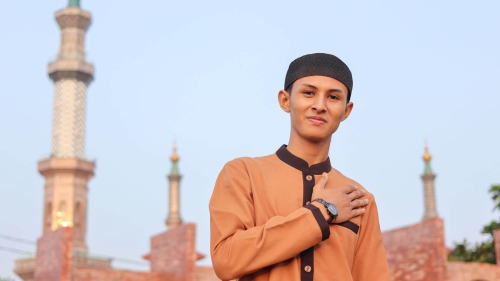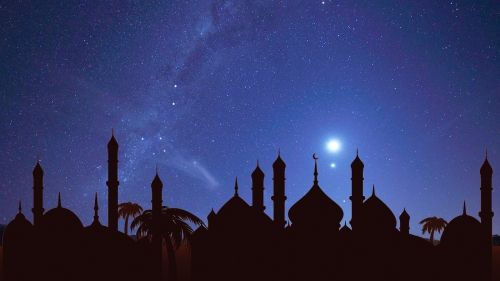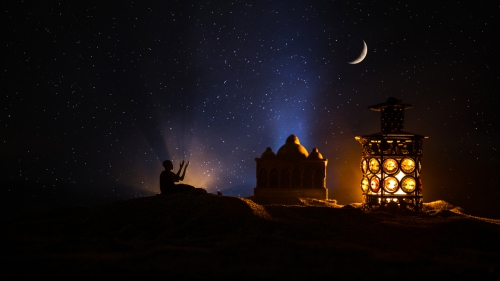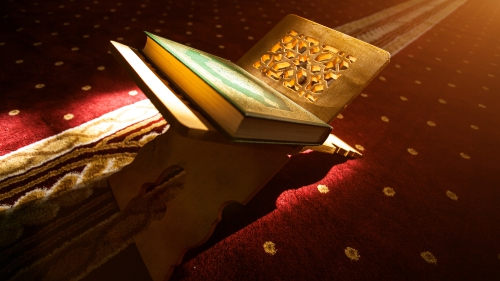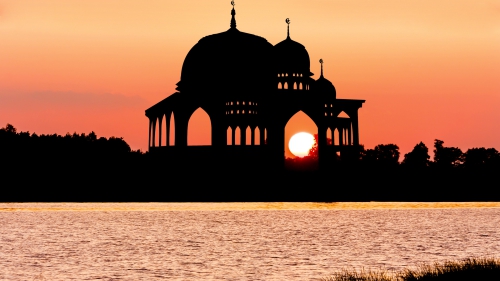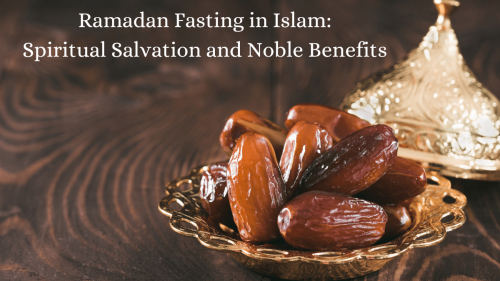Two Lessons from Surah al-Kahf

Surah al-Kahf is replete with enduring and ever-fresh lessons and signs. What follows is a brief discussion of two of them.
First: Islam is as much a social development and reform as a personal experience
Though the surah (chapter) is called al-Kahf, the Cave, the message presented therein is that the successful and complete implementation of the Islamic message is not compatible with the notions of caves, monasticism, strict asceticism, isolation and excessive idealism.
This is so because Islam is a religion of concrete action, deeds, comprehensive excellence, culture and civilization. It is as much a collective training, development and mission, as an individual endeavor and experience. Hence, such concepts as jama’ah (collectiveness and congregation), brotherhood, justice, accountability, integrity, kindness, philanthropy and being generally useful and beneficial to others, are paramount in Islam.
To be a true Muslim means to be constantly a doer of good, to become its embodiment at all levels of moral and spiritual life, and to become a source and conduit of all righteousness and virtue to others. Islam was never meant to be a religion of an abstract philosophy, a bombastic oratory, and impractical ideals and standards.
That is why Islam is so called, which means submission of one’s total being to the Will and Authority of Almighty Allah, the Creator and Master of the universe. Islam as a complete code of existence also means to live life not according to our shallow and manipulative wills and plans, but according to the absolute Will and Plan of our Creator and the Creator and Overseer of life.
Thus, when the People of the Cave (ashab al-kahf), or Cave Sleepers, went to the cave, they did so not because they so wanted or planned, but because they were forced to flee for refuge from their disbelieving folk. So risky and treacherous was the situation wherein they had lived that they in the end had to run away, so as to preserve their faith and save their lives.
Having been completely aware of what was happening, and why, and why they had ended up in the cave, they both calmly and purposefully surrendered their case to Allah, the Disposer of all affairs: “Our Lord! Bestow on us mercy from Yourself, and facilitate for us our affair in the right way!” (al-Kahf, 10).
Even after they had settled themselves in the cave, the Cave Sleepers knew that if their people came to know of them, they would have stoned them to death or abused and harmed them, trying to turn them back to their polytheistic beliefs and practices, in which case never would they have become successful (al-Kahf, 20).
Before escaping to the cave, the Cave Sleepers seem to have been very active, openly living and promoting the tawhidic (monotheistic) message of Islam against the phenomenon of polytheism and its diverse manifestations and degrees. Once in the cave, they knew that their new lifestyle was only due to a necessity and wasn’t by any means an ideal or a mandatory one. They knew, furthermore, that it was provisional in nature and that Allah, their Lord, will soon open a way for them from His mercy, will increase them in guidance, and will make easy for them their difficult situation.
Nonetheless, the case of the Cave Sleepers Almighty Allah used for attaining a potentially higher set of objectives and meanings, that is, a spiritual purification and enrichment of the people and their societal religious and also moral reform on the basis of the former. Allah thus reveals that “thus We made their case known (to the people), that they might know that the Promise of Allah is true, and that there can be no doubt about the Hour (al-Kahf, 21).
For this reason did the case of the Cave Sleepers commence secretly in the cave but ended most publicly and most assertively, so much so that the people of their city disputed among themselves about their case and about how best to commemorate and preserve their extraordinary legacy for posterity. Constructing a building over them was suggested, among other things. However, those who won their point, as a result of the intense dispute, said: “We verily shall build a place of worship (masjid) over them” (al-Kahf, 21).
That way, as well as by way of revealing the Qur’an and its surah al-Kahf, the case of the Cave Sleepers and the numerous at once spiritual and civilizational portents associated with it became immortalized forever. Thus, their supplications had been answered and Allah facilitated for them their affair in the most appropriate and fruitful manner.
Similarly, the case of Prophet Muhammad (pbuh) and his prophethood started in a cave, Cave Hira’. He, too, neither wished nor planned to willingly reside – albeit temporarily -- there, but was forced indirectly by the ignorance, confusion, corruption, oppression, injustice and wickedness of his era. He knew all too well that there was more to human life and existence in general than what had been served on the platters of existing cultures and civilizations. But what was that?
As a sign of his desperate seeking of answers, Prophet Muhammad (pbuh) was inclined to intermittently flee to the Cave, striving in the process to further nurture and preserve the purity of his blessed soul, and the clarity as well as rationality of his intellect. However, having received the first revelation in the Cave, and with that his “appointment” as the final messenger of Allah to mankind, assigned to convey to all people the final revelation of Islam as a complete worldview and a total way of life, he left the Cave and never returned to it again.
Yet, when the city of Makkah and many of its citizens refused to free themselves from the “caves” and “entrapments” of their ignorance, superstitions, falsehood and sin, the Prophet (pbuh) had to seek other alternatives and allow Islam to be fully implemented. Islam’s full potential had to be realized, its message optimized, and its light allowed to fully glow and be liberally experienced and lived.
The spiritual, intellectual and cultural “caves” and “entrapments” of Makkah proved a hindrance, eventually driving away the Prophet (pbuh) and his followers. However, when the city of Yathrib (a collection of loosely interrelated settlements) with most of its population accepted Islam and welcomed the Prophet (pbuh) and their fellow Muslim brethren from Makkah, a new hope with endless possibilities was suddenly found. Islam as a religion of comprehensive social development and reform programs, plus total culture and civilization, in addition to a continuous personal spiritual, moral and intellectual enhancement and growth, finally found its home.
It was on account of all this that the Prophet (pbuh) immediately changed the name of Yathrib to Madinah (meaning simply “the city” and “the place of civilization”), reverberating thereby the latest dramatic developments in his prophetic mission. The word Madinah is derived from the Arabic verb maddana and noun tamaddun, which mean to civilize (urbanize) and civilization respectively. From the same root the concepts madaniyy and mutamaddin, both of which denote civilized, civil and cultured, are derived, too.
The Prophet’s (pbuh) and the first Muslims’ fleeing from Makkah to Madinah is known as hijrah or migration, but, in fact, it was a form of liberation as well. It was the beginning of a process that approximately eight years later culminated in the actual liberation (fath) of Makkah itself, and with it the liberation of the hearts and minds of its inhabitants.
Second: Our worldview and life patterns are not to be based on ignorance, conjectures, delusions and myths
The surah begins with an emphatic statement that the Qur’an (the Book) was sent down by Almighty Allah, and that He has made it straight and clear without making or placing in it any crookedness or deviance. This is to be regarded as one of the major heavenly gifts to mankind due to which all praise and thanks are to be always Allah’s only (al-Kahf, 1-2).
This is a very important declaration at the outset of a surah that contains a series of extraordinary historical episodes which, if not dealt with properly, could be divested of their authentic significance and meanings and be shrouded in the deceptive wraps of either embellished, or outright distorted tales, legends and mysteries.
The chief aim of the surah is to reveal the truth, however spectacular or enigmatic it seemed to the people, and to give warning to the disbelievers and polytheists of a severe punishment from Allah, and also to give glad tidings to the believers, who do righteous deeds, that they shall have a fair reward on the Day of Judgment wherein they shall abide forever (al-Kahf, 2-3).
This approach of the Qur’an -- or Allah’s revealed knowledge to mankind, as opposed to the conventional rational and empirical knowledge, the latter being acquired by means of observation, description, experimentation and explanation of natural phenomena -- helps the believers come to terms with and easily absorb the all-embracing worldview of Islam, basing on it a comprehensive culture of behavioral excellence.
An integration of the sound worldview and an excellent behavioral paradigm denotes the foremost prerequisite for success in life. A flaw – or flaws -- either in the ways some animate or inanimate, physical or metaphysical, realities of life are perceived and interpreted, or in ways some behavioral aspects or interactions with regard to the same existential realities are formed and accomplished, is bound to cause a corresponding negative effect on a person’s life purpose and mission.
Allah, the Creator of both life and man, affirms that everything on earth, the physical locus of man’s honorable mission, has been made as an adornment for it, “in order that We may test them (mankind) as to which of them are best in deeds. And verily, We shall make all that is on it (the earth) a bare dry soil” (al-Kahf, 7-8).
Thus, for the people to succeed, they must understand what an adornment and what a substance on earth is, what is perishable and what is everlasting, what the fact and what the fiction is, and what the truth and what the falsehood is. A person must synchronize his life undertakings with such a realization if he wanted to be best in deeds, that is, to do good deeds in the most perfect manner. He, for example, will know that “wealth and sons are allurements of the life of this world; but the things that endure, good deeds, are best in the sight of your Lord, as rewards, and best as (the foundation for) hopes” (al-Kahf, 46).
Conversely, failing to rise above the inhibiting constraints of matter and their ego, as well as failing to dispense with their incapacitating spiritual and intellectual impediments, disbelievers and agnostics cannot see, nor understand, when the truth is presented to them in whatever form and through whatever means. Their misunderstandings and misinterpretations of the truth only reflect the extent of their spiritual and intellectual deficiencies and disorders.
Owing to the nature of the content of the surah, recurring allusions to the condition of such people have been made.
For example, Christians are said to have attributed a son to Allah because “no knowledge have they of such a thing, nor had their fathers” (al-Kahf, 5). It is all due to some cleverly fashioned and articulated falsehoods, forgeries and myths.
Also, the miracle of the Cave Sleepers many unenlightened and myopic persons wanted to reduce to just a legend or a mystery, dwelling mainly on some secondary or purely irrelevant aspects of the miracle.
That was the case also on account of such people’s ignorance, dishonesty and prejudice, resorting to “guessing at the unseen” (al-Kahf, 22). Concerning, for instance, the number of the Cave Sleepers, the Prophet (pbuh) and Muslims were advised to adopt this principled mode: “Say: ‘My Lord knows best their number. It is but few that know their (real case). Enter not, therefore, into controversies concerning them, except on a matter that is clear, nor consult any of them about (the affair of) the Sleepers’” (al-Kahf, 22).
Moreover, a person who had been given two gardens of grape (al-Kahf, 32-43) was ruined because he behaved in a state of pride and disbelief, and with his arrogant and flawed worldview, he never stopped displaying salient elements of disbelief in Allah, his Creator, and in the Day of Resurrection.
On the other hand, when Prophet Musa (Moses) met a mysterious man – or an angel in the form of a human being -- called Khidr, and witnessed subsequently with him a series of truly amazing and wondrous things that defied all logic and reason, Musa was able to comprehend the real state of affairs. Although he persistently exhibited typical and overwhelming human weaknesses, he was fully aware that what had transpired was nothing but the result of a special knowledge Khidr had been taught by Allah. Thus, Musa only wanted to follow the man – or the angel -- so that he could learn something of what he had (al-Kahf, 66).
There was nothing unconditionally mysterious, nor secretive, in the whole matter. Khidr himself summed it up by saying: “And I did them not of my own accord” (al-Kahf, 82). However, the only problem with Musa was that he could not hold patience. And how could he have full patience about things which he did not know? (al-Kahf, 69). Whereas it is many people’s deficiency and snag to deny that which they encompass not in knowledge and whose interpretation has not yet come to them (Yunus, 39).
The lessons hereby are multiple and are related to the thirst for genuine knowledge, the ethics of pursuing knowledge, and being responsible when having it and patient when devoid of it. It is also to be learnt that Allah alone is truly the Knowledgeable One. He is the Omniscient, the All-Knower, and the All-Wise. He is the One Who gives the gift of knowledge, so even the angels declared that “we have no knowledge except what You have taught us” (al-Baqarah, 32), for, indeed, “above everyone who is endowed with knowledge there is One the All-Knowing” (Yusuf, 76).
Dhul-Qarnayn (“he of the two horns”), a mighty and wise king, likewise, was not carried away in the slightest by his enormous power and riches. He refused to say or do anything that could make him an extraordinary, yet otherworldly, legend and a folk tale hero. He was cognizant and appreciative of the truth that it was Allah, his Creator and Lord, Who had established him in the earth and had given him the means of everything (al-Kahf, 84). He used to say that the material, spiritual and intellectual wealth, authority and power in which his Lord had established him are most genuine and unsurpassed, and hence, better than anything the people could offer him (al-Kahf, 95).
What’s more, Dhul-Qarnayn used to make the ordinary people participate in his astonishing feats (al-Kahf, 96), implying thereby that he, after all, was an everyday mortal entrusted with extraordinary power with which came extraordinary responsibility, and that they and their diverse talents were also very important, without which he alone would not be what he really was.
Civilization, it stands to reason, is a composite of different roles and contributions afforded by individuals, organizations and institutions, each and every one participating and contributing an expected share. Civilization, furthermore, is not merely about individuals and groups. Rather, as a concept and sensory reality, it is an entity, or an organism, on its own which has separate but complementary functions. The functions are expected to be performed exquisitely and in unison, generating in the process what could be described as civilizational miracles.
Modern-day scenario
All the points mentioned above are crucial, especially nowadays when the West-dominated civilization, despite its outward glitter and ostensibly attractive wrappings in which it is being served, fails man in a number of critical sectors of his existence. Thus, many of the basic existential questions and dilemmas are yet to be adequately addressed, let alone be solved. Those questions and dilemmas revolve around the nature and purpose of life and death, the idea of God, man and his life mission, the universe, morality, the soul, knowledge, aliens (the question whether we are alone in the universe) etc.
Surely, what man has accumulated of his material wealth is not in a position to offset the lack of answers to the above fundamental questions. That is so because man’s objective on earth is not to hanker after and amass material, but rather spiritual, intellectual and ethical, fortune and prosperity. Nobody fancies perishable riches and assets, which he is set to lose anytime. Everyone wants real, rather than virtual, assets. Nobody wants to have today, but not have tomorrow.
Unquestionably, the greatest asset with a person is his self. Hence, nobody is happy with the prospect of him dying or disappearing forever. Nobody wants to die and become nothing. We all use our fleeting lives trying our best to become one day somebody or something.
Accordingly, the state of the modern man is such that he seems to have everything, yet, in actual fact, he has very little, or nothing. He seems to know everything, yet, in fact, he knows very little that is real and authentic. Though unconditional happiness and love, as the two most magnificent and most coveted life ideals, are on everyone’s lips, yet the modern man falls miserably short of achieving and genuinely experiencing them. So depressed and despondent is he and his lifestyle that true happiness and love might be of those things he will never even partially realize.
This estimation makes sense in that true happiness and love are not compatible with a confused, disoriented, uncertain, doubtful, superstitious and ignorant person. He cannot help himself, so how could he be useful and helpful to others? Such a person does not have enough courage, nor capacities, for true happiness and love. He is not qualified for them. Thus, they repel one another.
Though he tries to deny it, the modern man knows all too well that living for something which he will soon part with forever is not the way life should be lived. There should be something more meaningful, purposeful and consequential to life. But what is that?
Since there are no definite, nor satisfactory, answers forthcoming, the modern man, in order to somehow gratify momentarily his restless soul and inquisitive mind, evolved a myriad of sweet lies, fibs, mysteries, fairytales, myths and doubts regarding the most serious life aspects. So much so that it could be asserted that the modern civilization, despite it priding itself on being a civilization of enlightenment, reason, science, freedom and liberalism, is based on actual ignorance, uncertainty, agnosticism, narrow-mindedness, superstitions, fabrications and falsehoods. It has mastered the art of deception, guiding man to the abyss of the unknown – of which everyone is most terrified -- and in the end, to his utter ruin.
Modern civilization seduces, beguiles and makes its devotees addictive to its bogus promises and splendor. On the whole, it is an extremely destructive force. It “kills” and shuts man forever inside the “cave” of his skeptical mind and corrupted soul (nafs or self). Islam’s aim is to rescue man from such a distressing agony.
That petrifying fate is vividly depicted at the end of the surah where Almighty Allah refers to the greatest losers in respect of their deeds. They are those whose efforts have been wasted in this life while they thought, deceived by the superficiality, allure and showiness of their means and standard of living, that they were fine and were acquiring good by their deeds. So, their hollow works – along with the defective philosophical foundations for them -- were in vain, and on the Day of Resurrection, no weight or importance will be assigned for them (al-Kahf, 103-105).
Finally, the solution for the spiritual, cultural and civilizational predicaments of mankind lies in the substance of the first and last verse (ayah) of the surah, which sandwich the whole of its content and messages. That solution is to the effect that the only way forward is the Qur’an as the last testament from Allah to mankind, and as mercy, a guidance for the people, clear proofs or signs, and the criterion or judgment between right and wrong.
With the Holy Qur’an onboard, the people will be able to come to terms with, and to fully grasp, the greatest ontological truths, especially such as are related to God, life, the Prophet (pbuh) and his heavenly mission, man and his life objective and purpose. So, therefore, as the last words of the surah, “whoever hopes for the meeting with his Lord, let him work righteousness and associate none as a partner in the worship of his Lord” (al-Kahf, 110).






